#george augustine washington
Text
24 Days of La Fayette: December 10th - George Augustine Washington
Todays Aide-de-camp is the nephew of George Washington – and one of his favourite nephews as well. George Augustine was born around 1759 to George Washington’s youngest brother Charles Washington and his wife Mildred Thornton Washington.
While not much about the early years of George Augustine is known, his service in the American War of Independence is very well documented.
He joined the army in 1777 and was initially offered a junior officer’s commission in William Grayson’s Additional Continental Regiment. George Augustine declined in favour of an equal position in the prestigious corps of light horse. In 1778 he was made a coronet in the partisan legion under the command of Major Henry Lee. During this period of his life, young Washington’s health began to seriously suffer for the first time – in the course of the coming years he sometimes enjoyed better, sometimes worse health, but he would never again fully recover, and he died at a young age. By the end of 1778 he was forced to resign his post due to this illness. In the summer of 1779, he was well enough to serve as a volunteer aide-de-camp to General George Washington. On February 16, 1780, he was on duty with the Commander-in-Chief’s Guard. By mid-1780, La Fayette had been given command of a light infantry division and George Augustine Washington joined the Marquis’ staff as an Aide-de-camp.
George Washington Augustine is only seldomly mentioned in La Fayette’s letters, but it can nevertheless be judged, that the two of them had a close relationship and that La Fayette trusted Washington with important tasks. It also appears that Washington got quite well along with the other officers in La Fayette’s staff and the other (foreign) officers.
La Fayette wrote to the Vicomte de Noailles on September 2, 1780:
MM. Washington and Gimat send you a thousand compliments, and I embrace you.
Vol. 3, 156-159
Although his illness, today believed to be tuberculosis, again flared up during this time, he was very active during the Siege and following Battle of Yorktown. Upon La Fayette’s second return to France in 1781, George Augustine returned to the staff of his uncle before resigning once and for all in the spring of 1782 due to his deteriorating health. George Augustine spend much of the following three years travelling to the southern parts of the United States as well as abroad to Bermuda and Barbados in search of a cure for his ailments. In May of 1785, he had returned to his native Virginia and promptly proposed to Frances “Fanny” Bassett. The pair was married on October 15, 1785 and initially moved in with George and Martha Washington. In 1786, George Augustine and Fanny were gifted more than 200 acres of land from George Washington to start their own family there.
Charles Washington, son of Augustine & Mary, married Mildred Thornton, daughter of Colonel Francis Thornton of Spotsylvania County, by whom he has four Children, George Augustine, Frances, Mildred & Samuel. George Augustine married Frances Basset, daughter of Colo. Burwell Basset of New Kent by whom he has had four Children, three of whom are living—viz.—Anna Maria, George Fayette, & Charles Augustine. Frances, married Colo. Burgess Ball by whom she has had several children. Mildred and Samuel are unmarried.
“Enclosure: Washington Genealogy, 2 May 1792,” Founders Online, National Archives, [Original source: The Papers of George Washington, Presidential Series, vol. 10, 1 March 1792 – 15 August 1792, ed. Robert F. Haggard and Mark A. Mastromarino. Charlottesville: University of Virginia Press, 2002, pp. 334–338.] (09/30/2022)
By autumn of 1785, George Augustine had begun managing his uncle’s estate Mount Vernon. He was taught the ropes by Washington himself and in later years, when Washington’s call to public service led to longer absences, undertook more and more responsibility. George Augustine was a military man, accustomed to duty and discipline – sentiments that leaked into his managing-style and were often remarked upon. Here is a sample of George Augustine's handwriting from his plantation records (work and weather report) from October 27, 1792:
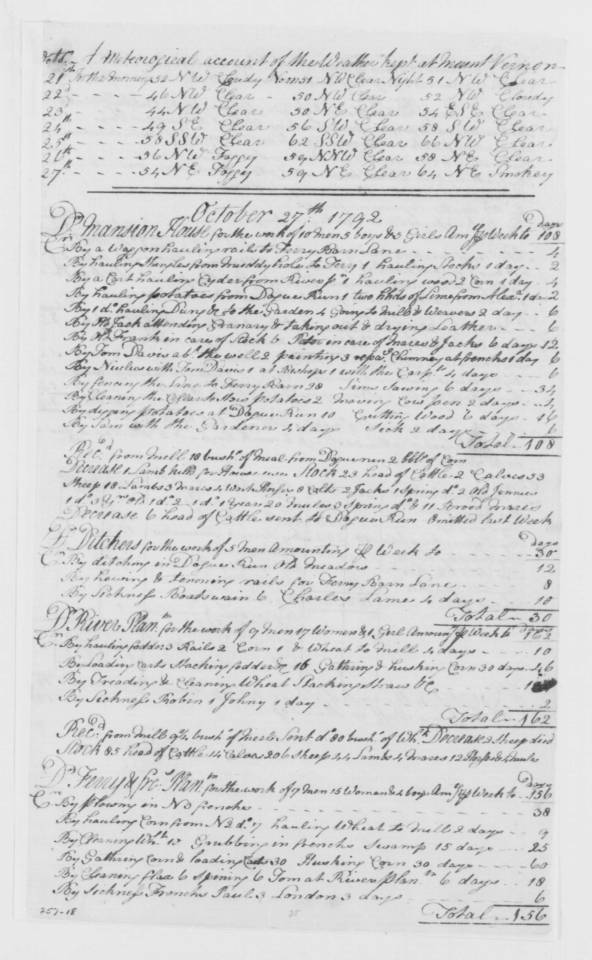
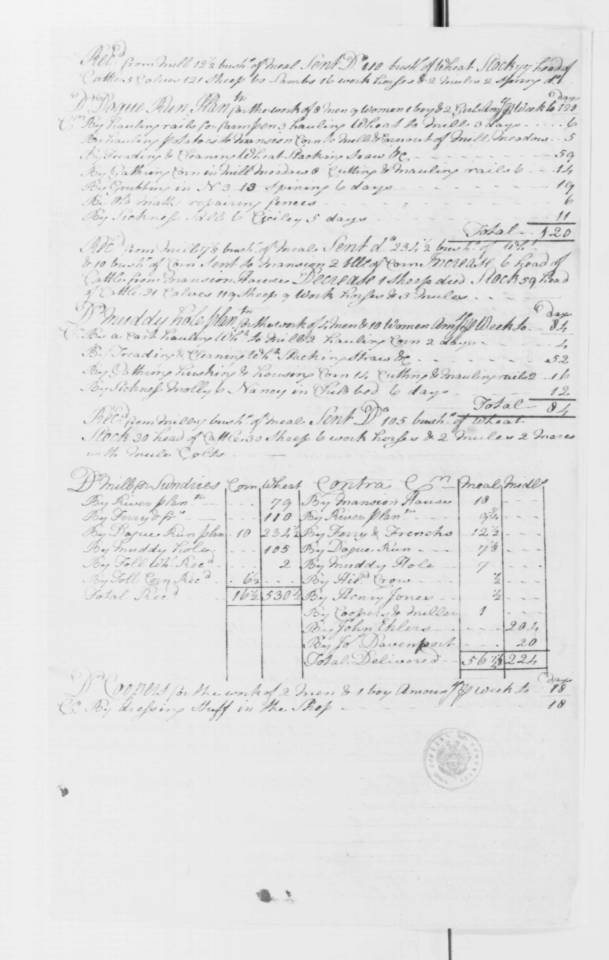
George Washington Papers, Series 4, General Correspondence: George Augustine Washington, Plantation Records: Work and Weather Report. 1792. Manuscript/Mixed Material. Retrieved from the Library of Congress. (10/19/2022)
George Augustine missed La Fayette’s return to the United States in 1784 and subsequent visit to Mount Vernon by a few days but wrote to his uncle on August 14, 1784:
(…) should my worthy friend the Marquis be with You I beg to be rememberd to him in the most friendly terms. I should have wrote Him but apprehending from a peeice of information I recieved from a person immediately from Philadelphia, that He had not accomplished His visit, He mentiond that accounts had been recieved of His having saild but from a desaster that befel the Vessel He was obliged to return (…)
“To George Washington from George Augustine Washington, 14 August 1784,” Founders Online, National Archives, [Original source: The Papers of George Washington, Confederation Series, vol. 2, 18 July 1784 – 18 May 1785, ed. W. W. Abbot. Charlottesville: University Press of Virginia, 1992, pp. 39–41.] (09/30/2022)
His health had been long suffering. His bodily state became so worrisome, that George Washington felt prompted to write the following lines to Tobias Lear on September 21, 1792:
Poor George! He is, I believe not far from that place, from whence no traveller returns. He is but the shadow of what he was; he has not been out of his room & scarcely from his bed these six weeks. At times he has intervals of ease which flatter a little, but I have little hope of his surviving the Winter.
“From George Washington to Tobias Lear, 21 September 1792,” Founders Online, National Archives, [Original source: The Papers of George Washington, Presidential Series, vol. 11, 16 August 1792 – 15 January 1793, ed. Christine Sternberg Patrick. Charlottesville: University of Virginia Press, 2002, pp. 133–135.] (09/30/2022)
George Washington also wrote to the Marquis de La Fayette on June 10, 1792:
I am afraid my Nephew George, your old aid, will never have his health perfectly re-established, he has lately been attacked with the alarming symptom of spitting large quantities of blood, and the Physicians give no hopes of a restoration unless it can be effected by a change of air, and a total dereliction of business (to which he is too anxiously attentive he will, if he should be taken from his family & friends, leave three fine child:—viz.—two Sons & a daughter—the eldest of the boys he has given the name of Fayette to and a fine looking child he is).
“From George Washington to Lafayette, 10 June 1792,” Founders Online, National Archives, [Original source: The Papers of George Washington, Presidential Series, vol. 10, 1 March 1792 – 15 August 1792, ed. Robert F. Haggard and Mark A. Mastromarino. Charlottesville: University of Virginia Press, 2002, pp. 446–448.] (09/30/2022)
There have actually been two children named Fayette. Two boys were named George Fayette Washington, but the older son only lived for a few short weeks. The younger son, born on January 17, 1790, died on August 6, 1867.
George Augustine Washington himself died on February 3, 1783. His death hit George Washington hard. He wrote to David Humphreys on March 23, 1783:
(…) and the death of my Nephew, the poor Major, will, I apprehend, cause my private concerns to suffer very much. This melancholly event took place on the 5th of last month at Colo. Bassett’s, where he had gone hoping to benefit from a change of air & situation—Altho’ it had been long expected—and indeed, to me, of late, appeard inevitable; yet I have felt it very keenly.
“From George Washington to David Humphreys, 23 March 1793,” Founders Online, National Archives, [Original source: The Papers of George Washington, Presidential Series, vol. 12, 16 January 1793 – 31 May 1793, ed. Christine Sternberg Patrick and John C. Pinheiro. Charlottesville: University of Virginia Press, 2005, pp. 362–364.] (09/30/2022)
On April 9, 1783, George Washington wrote to Bryan Fairfax about his nephew’s funeral service:
At One ’oclock afternoon on Thursday next, I mean to pay the last respect to my deceased Nephew—by having the funeral obsequies performed.
If you will do me the favor to officiate on the occasion, it will be grateful to myself, & pleasing to other friends of the deceased. No Sermon is intended, and but few friends will be present; for these dinner will be ready at half after two Oclk, at which I should be happy & shall expect to see you.
“From George Washington to Bryan Fairfax, 9 April 1793,” Founders Online, National Archives, [Original source: The Papers of George Washington, Presidential Series, vol. 12, 16 January 1793 – 31 May 1793, ed. Christine Sternberg Patrick and John C. Pinheiro. Charlottesville: University of Virginia Press, 2005, p. 442.] (09/30/2022)
The service was performed on April 11, 1793.
La Fayette had been caught up in the French Revolution at the time of George Augustine’s death and only much later learned of the young man’s death. He wrote to George Washington after his release from prison on May 9, 1799:
George had on his return from America acquainted me with the melancholy news that my Dear aid de Camp, your worthy nephew was no more—I heartily feel the affectionate attention he had to call after me his eldest Boy—my tenderest wishes shall ever attend what remains of that excellent Man.
“To George Washington from Lafayette, 9 May 1799,” Founders Online, National Archives, [Original source: The Papers of George Washington, Retirement Series, vol. 4, 20 April 1799 – 13 December 1799, ed. W. W. Abbot. Charlottesville: University Press of Virginia, 1999, pp. 54–59.] (09/30/2022)
George Augustine’s widow went on to marry Tobias Lear, George Washington’s private secretary, in 1795 before dying herself of tuberculosis in 1796.
#marquis de lafayette#24 days of la fayette#lafayette's aide-de-camps#french history#american history#american revolution#history#letter#la fayette#founders online#charles washington#george augustine washington#1777#1778#1779#1780#1784#1785#1792#1793#georges washington de lafayette#tobias lear#library of congress#handwriting
13 notes
·
View notes
Text
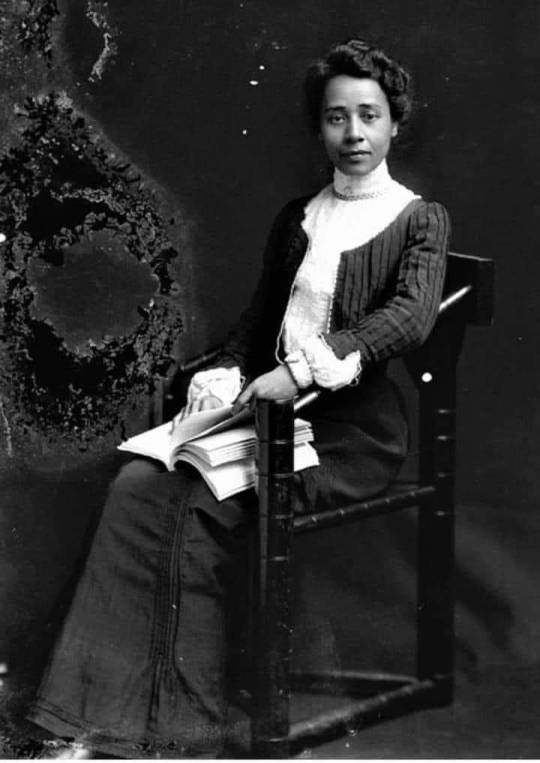
𝗔𝗡𝗡𝗔 𝗝𝗨𝗟𝗜𝗔 𝗛𝗔𝗬𝗪𝗢𝗢𝗗 𝗖𝗢𝗢𝗣𝗘𝗥 (1858-1964)
Anna Julia Haywood Cooper was a writer, teacher, and activist who championed education for African Americans and women. Born into bôndage in 1858 in Raleigh, North Carolina, she was the daughter of an enslaved woman, Hannah Stanley, and her owner, George Washington Haywood.
In 1867, two years after the end of the Civil Wàr, Anna began her formal education at Saint Augustine’s Normal School and Collegiate Institute, a coeducational facility built for former slàves. There she received the equivalent of a high school education.
Anna Haywood married George A.G. Cooper, a teacher of theology at Saint Augustine’s, in 1877. When her husband died in 1879, Cooper decided to pursue a college degree. She attended Oberlin College in Ohio on a tuition scholarship, earning a BA in 1884 and a Masters in Mathematics in 1887. After graduation Cooper worked at Wilberforce University and Saint Augustine’s before moving to Washington, D.C. to teach at Washington Colored High School. She met another teacher, Mary Church (Terrell), who, along with Cooper, boarded at the home of Alexander Crummell, a prominent clergyman, intellectual, and proponent of African American emigration to Liberia.
Cooper published her first book, A Voice from the South by a Black Woman of the South, in 1892. In addition to calling for equal education for women, A Voice from the South advanced Cooper’s assertion that educated African American women were necessary for uplifting the entire black race. The book of essays gained national attention, and Cooper began lecturing across the country on topics such as education, civil rights, and the status of black women. In 1902, Cooper began a controversial stint as principal of M Street High School (formerly Washington Colored High). The white Washington, D.C. school board disagreed with her educational approach for black students, which focused on college preparation, and she resigned in 1906.
In addition to working to advance African American educational opportunities, Cooper also established and co-founded several organizations to promote black civil rights causes. She helped found the Colored Women’s League in 1892, and she joined the executive committee of the first Pan-African Conference in 1900. Since the Young Women’s Christian Association (YWCA) and the Young Men’s Christian Association (YMCA) did not accept African American members, she created “colored” branches to provide support for young black migrants moving from the South into Washington, D.C.
Cooper resumed graduate study in 1911 at Columbia University in New York City, New York. After the death of her brother in 1915, however, she postponed pursuing her doctorate in order to raise his five grandchildren. She returned to school in 1924 when she enrolled at the University of Paris in France. In 1925, at the age of 67, Cooper became the fourth African American woman to obtain a Doctorate of Philosophy.
In 1930, Cooper retired from teaching to assume the presidency of Frelinghuysen University, a school for black adults. She served as the school’s registrar after it was reorganized into the Frelinghuysen Group of Schools for Colored People. Cooper remained in that position until the school closed in the 1950s.
Anna Julia Cooper dièd in 1964 in Washington, D.C. at the age of 105.
#anna cooper#black tumblr#black history#black literature#black community#black excellence#civil rights#black history is american history#black girl magic#blackexcellence365
75 notes
·
View notes
Text

𝗔𝗡𝗡𝗔 𝗝𝗨𝗟𝗜𝗔 𝗛𝗔𝗬𝗪𝗢𝗢𝗗 𝗖𝗢𝗢𝗣𝗘𝗥 (1858-1964)
Anna Julia Haywood Cooper was a writer, teacher, and activist who championed education for African Americans and women. Born into bôndage in 1858 in Raleigh, North Carolina, she was the daughter of an enslaved woman, Hannah Stanley, and her owner, George Washington Haywood.
In 1867, two years after the end of the Civil Wàr, Anna began her formal education at Saint Augustine’s Normal School and Collegiate Institute, a coeducational facility built for former slàves. There, she received the equivalent of a high school education.
Anna Haywood married George A.G. Cooper, a teacher of theology at Saint Augustine’s, in 1877. When her husband died in 1879, Cooper decided to pursue a college degree. She attended Oberlin College in Ohio on a tuition scholarship, earning a BA in 1884 and a Masters in mathematics in 1887. After graduation, Cooper worked at Wilberforce University and Saint Augustine’s before moving to Washington, D.C. to teach at Washington Colored High School. She met another teacher, Mary Church (Terrell), who, along with Cooper, boarded at the home of Alexander Crummell, a prominent clergyman, intellectual, and proponent of African American emigration to Liberia.
Cooper published her first book, A Voice from the South by a Black Woman of the South, in 1892. In addition to calling for equal education for women, A Voice from the South advanced Cooper’s assertion that educated African American women were necessary for uplifting the entire black race. The book of essays gained national attention, and Cooper began lecturing across the country on topics such as education, civil rights, and the status of black women. In 1902, Cooper began a controversial stint as principal of M Street High School (formerly Washington Colored High). The white Washington, D.C. school board disagreed with her educational approach for black students, which focused on college preparation, and she resigned in 1906.
In addition to working to advance African American educational opportunities, Cooper also established and co-founded several organizations to promote black civil rights causes. She helped found the Colored Women’s League in 1892, and she joined the executive committee of the first Pan-African Conference in 1900. Since the Young Women’s Christian Association (YWCA) and the Young Men’s Christian Association (YMCA) did not accept African American members, she created “colored” branches to provide support for young black migrants moving from the South into Washington, D.C.
Cooper resumed graduate study in 1911 at Columbia University in New York City, New York. After the death of her brother in 1915, however, she postponed pursuing her doctorate in order to raise his five grandchildren. She returned to school in 1924 when she enrolled at the University of Paris in France. In 1925, at the age of 67, Cooper became the fourth African American woman to obtain a Doctorate of Philosophy.
In 1930, Cooper retired from teaching to assume the presidency of Frelinghuysen University, a school for Black adults. She served as the school’s registrar after it was reorganized into the Frelinghuysen Group of Schools for Colored People. Cooper remained in that position until the school closed in the 1950s.
Anna Julia Cooper dièd in 1964 in Washington, D.C. at the age of 105.
31 notes
·
View notes
Text
Harrow the Ninth Pronunciation Guide

I keep coming back to that idea that he might have picked this name because of Caesar. It would be so funny if that was actually the case. Like, it would be like if in some future where the US had somehow ceased to exist, I don't know, conquered, destroyed, disestablished, whatever, only subject matter for historians now, etc. and some world leader was like, man, George Washington was really cool, I really admire that guy, I want everyone to think about George Washington when they hear my name. So I'm going to change my last name to George, because who else was there even who was named George? I bet this is exactly what the ancient Americans did to invoke this great man
But now I'm curious about how much of Earth's old cultural whatnot was still public knowledge 100 years after the Resurrection. Like, people don't seem to remember anything about that era anymore, but surely the people who were resurrected all knew about it, and I doubt all that knowledge just disappears in a generation. Did people know John's name back then, and its links to Christianity and at least that Gaius was a Roman name?

Ok, so, not really related to the pronunciation at all, but it occurs to me that we've now learned that Augustine and probably also Mercy and Gideon and their cavaliers would have been born on pre-Resurrection Earth and resurrected by John, since they are the founders of their Houses, right? And if supposedly all of the people who were resurrected spoke English, and English is still the operating language of the Nine Houses, they should have English names, right? Alfred is a perfectly traditional English name; Cristabel is not exactly traditional but perfectly believable as a name that someone would be given; Gideon, sure, biblical names never go out of fashion in the anglosphere, even the weird ones, for real I went to college with a guy named Cain; Augustine, well, Augustus has a fine tradition as a name, that seems like a believable variation on that. But are we meant to believe that there were English-speaking people on Earth before the Resurrection named Mercymorn and Pyrrha? I could buy Mercy by itself as a woman's name given by some incredibly religious Christians or something, but "Mercymorn" seems to be following the standard we have in these books of two part names like Harrowhark and Coronabeth and Jeannemary, which is not something that i think came from any Earth tradition. And I can't imagine anyone would have been named Pyrrha. Maybe her parents were Classics nerds, or something?

Augustine and Alfred were like quite possibly the very first people to ever have an arithmonym. How could there possibly have been any implications about any use of them at that point?

Honestly, I feel like it works much better as a reference to Pyrrhus, just in terms of names being significant in the context of the story, because of what happened to Gideon in the fight against Number Seven

It's kind of funny that she wrote a whole paragraph about this, but at no point did she actually define "dactylic enneameter" for anyone who didn't recognize the roots, as, presumably, a poetic meter where each verse consists of nine metric feet, which each consist of two unstressed syllables followed by a stressed one

This pronunciation makes me realize this is supposed to be apo + pneumatism. But the pneuma root is about movement of air. Is thanergy a force that only moves or exists or emanates/radiates due to the presence of air molecules, like sound? Is that why there is so little thanergy in space, and not just because there isn't a source of thanergy nearby? Light can obviously travel for huge distances from the source through space, because it doesn't rely on air molecules

I'm fairly certain that every other English word that derives from Greek meso- is pronounced either /mɛzoʊ/ or /mɛsoʊ/, so why is this one /misoʊ/?
24 notes
·
View notes
Text
I Am Once Again Thinking About The Locked Tomb And Language
This was brought on by my realization rereading HtN with context from Nona that if Jod was a New Zealander that is the accent he has, but mostly is unrelated to that. It just makes me read his stuff in Harrow slightly differently. Spoilers ahead, don’t care to differentiate where they come from specifically, assume all the way through. Also it gets a cut bc it got very long.
It’s been 10,000 years. There is GOING to be linguistic drift- arguably enough that Blood of Eden, who split from the Empire right at the beginning, should not speak remotely the same language as them, but we’ll set that aside both for fictional convenience and under the assumption that they were monitoring their enemies and kept up on the language that way. Still think they should have more of their own weird slang tho- but how MUCH drift to you get when you have a very present example of where you started.
Either the first group of Resurrected, Alecto, etc spoke the same language as Jod or they retained their original language from before their deaths. The latter seems like it would’ve been a problem and complicated the entire Empire speaking one language- Nona speaks all the languages, but Cohort is singled out as its own thing which not everyone speaks, or speaks well, and there are a multitude of other languages among the refugees. Presumably the linguistic descendants of the more varied languages that BoE started with. So the first few generations all share an accent, most slang and jargon, and so on.
But In 250 some odd years with an ocean between them the American and British accents have diverged significantly. The Houses are split out onto different PLANETS and it’s been TEN THOUSAND years. Without the Empire tying them together at this point I would expect them to be as mutually intelligible as any 8 randomly selected Indo-European languages. English, Sanskrit, Russian, and French may have had a common ancestor waaaayyyy back when, but it’s not enough to understand more than a handful of words in any of the others. On that basis, it would be reasonable a) for the Houses each to have developed their own accents and b) for them to still have drift from each other in minor ways- stuff like torch vs flashlight in British and American English.
BUT. We do not have any of our Proto-Indo-European ancestors here. We don’t have audio recordings of anyone’s voice going back very far at all. Accents and dialects that are rare or gone in modern usage that DO exist in recording aren’t generally imitated, but there also isn’t much of a reputational motivation to do so. There’s no prestige to it. You get people mimicking the 1940s rapid fire nasally sort of voice for comedy sometimes, some people do the Jackie O Midatlantic accent but it’s mostly queer people being camp, etc. However, I would posit that if there were prestige attached to it then more people would do this. Especially if that prestige was attached to a still-living individual.
What I’m saying is, if we had so much as a recording of George Washington then that accent would be taught in elocution classes and become a weird “My family’s rich and has been in politics for ages” sort of status symbol among US Senators. I posit that Jod would be treated the same way.
We can assume that Jod, Mercy, Augustine, and I think Gideon the First (? Don’t remember if he’s one of the first class who were Jod’s buddies pre-annihilation, pretty sure Pyrrha was though so we’re going to infer that he is too) all maintain that original accent. The closer you are to the Emperor and Lyctors, the more of a chance you have to match it. After the crew of the Erebos is sent to the front, they might be distinguishable from other cavaliers and adepts by their distinctly Godly diction.
I would also assume that all of the Houses have their own fairly distinct accents (or group of accents; we don’t know how much of each planet is livable space vs stuff like the Ninth’s drillshaft. More space = more linguistic drift between communities).
Sidenote: Harrow thinks several times about not wanting to come off as “provincial,” uninformed, various other things that can translate to “backcountry hick.” Please briefly imagine that the Ninth House accent is a cowboy accent. “We do bones, yeehaw!” It wouldn’t be, but like. Very serious goth Harrow, desperate to come off as impressive and intimidating. Skull face paint, bone corset, etc. Uses “y’all”
So occasionally Cohort soldiers DO get to retire home. They seem to have pretty high deathrates, but sometimes. Folks on the Erebos moreso, since for 80 years it’s kinda just where Jod drifts around and chills. So sometimes they’d come home with the knowledge to match Jod’s accent.
Some of them wouldn’t care. I have a hard time picturing the Fifth or Fourth caring much about that sort of flexing on each other, and the Sixth would mostly care in an academic sense. But the Eighth? seems like they’d care. The Third? ABSOLUTELY would care. They’d probably care the most, meaning that under this theory I would assume Ianthe and Corona have the closest accents to Jod and the Lyctors (probably causing Corona problems when she joins BoE?). The Ninth, which doesn’t seem to have anyone who was in the Cohort left on planet save Aiglamene and probably hasn’t in a long time even back when Harrow’s parents were young, probably does have one of the most drifted accents.
I also feel like it would make Jod so uncomfortable- for all he gave himself all the titles and set himself up as God he doesn’t seem to enjoy the genuflection and worship that comes with the gig. He mostly seems somewhere on a spectrum between awkward and annoyed. Having a portion of the people who work with you slowly come closer and closer to matching your accent to a greater degree than seems likely just from the way some people’s voices do unconsciously shift toward matching those they spend time around would feel so uncanny valley. But it’s not like he can call them out on it? That would be so weird? He doesn’t KNOW that that’s what they’re doing. So he just. Has to live with it. And I’m always up for giving Jod some petty suffering.
#the locked tomb#tlt#john gaius#meta#locked tomb meta#language#this is mostly spitballing without great organization but whatever. it's mostly an idea i like to rotate in my head a lot#ink meta#ink post
104 notes
·
View notes
Text
Goreg Washesaton for richie my beloved
so you may have noticed that this ongoing series of my research of "every historical figure" (/t) for @thereallvrb0y has been on pause for a few weeks and thats bc ive been STRUGGLING to find the rest of them, and i cant. so if anyone needs information on those people, i might just post the bullets from my notes bc im not doing all that work again FKSFKSH they still exist somewhere within my 3000 posts, but i cannot find them bc tumblr sucks <3 anyway, now for
George Washington (pt one)
Georgie was born at his family's plantation, Popes Creek, in Westmoreland County, Virginia, on February 22, 1732, a date that I have memorized for some reason when I don't even have my dad's birthday memorized (sorry dad). His parents were Augustine and Mary Ball Washington. Augustine was a very prominent plantation owner in the area, and also a justice of the county court, so he was a big deal. His first wife, Jane Butler, died and left him with two sons, Lawrence and Augustine Jr., and their daughter Jane.
George was the eldest of the kids from the second marriage. His other siblings were Elizabeth, Samuel, John Augustine, Charles, and Mildred.
The family eventually moved to another one of their properties, Little Hunting Creek, which would become Mount Vernon. They moved again four years later to Ferry Farm.
Augustine Sr. died when George was 11, leaving most of his property to the eldest sons from the first marriage. The remaining income maintained Mary and her children, and George would have been responsible for helping manage their plantation.
George never received a formal education since the funds for that were used on his older brothers. He only received instruction from private tutors. He would have studied reading, writing, basic legal forms, geometry, trigonometry, manners, penmanship, and comportment. I already made a post about his rules of civility, which was a big part of his education.
Mount Vernon, where I got most of my sources from on Washington, of course, has a lot of information on slavery, but I'm not really qualified to talk about all of that since I think it deserves its own separate research, but here's the link for that.
The Washingtons were, however, deeply entangled in the global "institution" (that phrasing makes me uncomfy, it sounds like a business yk). Washington inherited 10 enslaved people from his father, and went on to "inherit/purchase/rent/gain control of" more than 500 enslaved people.
Washington expressed racist sentiments up until the Revolutionary War, which greatly changed his perspective on the definition of liberty and who it applies to. He expressed wanting to free the enslaved people he was responsible for, but couldn't because of the backlash it would cause from him being an international celebrity. He would end up freeing the 123 enslaved people he was able to in his will (that's a whole complicated legal system designed to keep people and their families enslaved for as long as possible and it's honestly exhausting).
Anyway, back to the white people history. Washington got his first job as a surveyor, and it was the only thing he got formal training in. In the mid-1740s he got two surveying jobs (one of which was for a They were going to lay out lots within a large tract along the western frontier of Virginia, and into indigenous territory. He learned more surveying and gained important knowledge of the frontier (*foreboding dramatic movie sound effect*). At the end of the first day, he was shown "a bed of straw with one Threat Bear blanket with double its Weight of Vermin such as Lice Fleas etc. (sic)" He made a promise "not to Sleep so from that time forward chusing rather to sleep in the open Air before a fire. (sic)" This experience ended up being very important to him and getting him out of that cushy rich kid life (*another foreboding dramatic movie sound effect*)
His professional career began in 1749, and recieved a commission for the new Culpepper County (*insert Turn: Washington's spies theme song*), which was probably by the recommendation of Fairfax, who was working on the Governor's council. By 1752, he had completed nearly 200 surveys, totaling more than 60,000 acres. Honestly, I think that if he lived his entire life as just a surveyor, he wouldn't have gone gray in his 40's.
in 1753, Governor Robert fucking Dinwiddie that was this man's NAME in REAL LIFE learned that French troops had moved south from Canada to construct forts in the region south of Lake Erie, which was declared British territory. The area had commercial potential, and Dinwiddie was concerned that the French would fortify the forks of the Ohio River. So, he sent Washington, who was a major in the Virginia militia, to deliver a diplomatic eviction notice to the French in 1753. If that date sounds familiar its bc Georgie is about to have a few major fuck ups that you learned about in middle school. This was known as the Allegheny Expedition, but I have never called it that. It is and will always be the Ohio Eviction.
The expedition was aided by Christopher Gist and local indigenous people. They were escorted by O-non-dowa-gah (also known as Seneca) chief Tanacharison, two Haudenosaunee (Iroquois), and one from the Lenape (Delaware Nation).
This trip was rough. During the trip, Washington hiked for days through snowy woods, fell off a raft into the icy Allegheny River, nearly drowned, and had to spend a freezing night on an island without shelter on the 900 mile journey. I hate to say it, but this dad could beat up your dad. They reached Fort Le Boeuf on December 11, thank fuck. Washington's account was published by Dinwiddie in Williamsburg and London, giving him a reputation at the age of 22.
Despite all that effort, the French just ignored them lmao, bc like what's this little freak gonna do??? So, Dinwiddie dispatched Washington, now a Lieutenant Colonel to assert Virginia's claims a few months later with around 150 men.
They ended up skirmishing with French soldiers on the way, and killed 10 men, including the French commander, Joseph Coulon de Villiers, Sieur de Jumonville. The English under Washington (that's fun to say) retreated to a makeshift fort called Fort Necessity. Washington was forced to surrender when the French surrounded the fort with their indigenous allies. In those surrender terms, Washington accidentally admitted to assassination. This was the start of the French and Indian War, or the Seven Years War for my European fanbase (im so funny).
Washington resigned after that bc his dick was small and he was embarrassed. But, don't worry, his dick regrew and he returned to the frontier in 1755 to serve as a volunteer aide-de-camp (foreshadowing) to General Edward Braddock, who was kind of serving. Braddock had been sent from the King to drive the French from the Ohio Country.
A battle started near the Monongahela River (none of these places have easy names). There was a lot of confusion and troops fled in confusion back to Virginia. Washington was attempting to rally the troops, and had two horses shot out from under him and four bullets shot through his coat. Also Braddock died whoops.
Washington was given command of Virginia's entire military force. He was ordered to protect the entire 350 mile long frontier with a few hundred men, bc everything that happens to this man is fair. This provided him with very necessary experience in commanding troops in stupid ass situations. Eventually, the British took the forks of Ohio in 1758 and Washington retired.
He married our iconic queen Martha on January 6, 1759 and they kissed a lot. He spent 1759-1775 overseeing the farms at Mount Vernon. He constantly worked to improve and expand the mansion and surrounding plantation.
During this time, he established himself as an innovated farmer. In the 1760s, he switched from tobacco to wheat as his main cash crop. He experimented with new crops, fertilizers, crop rotation, tools, and livestock breeding. He actually had some hot takes, but I'm literally the only person who cares bc that shit is actually boring (in case you were wondering, chicken shit doesn't make good fertilizer).
He also expanded the planation to include flour milling and commercial fishing. THEN he built a gristmill, and then began making whiskey, producing over 11,000 gallons of rye whiskey at its peak. Mf slayed.
This era is referred to as the golden years, which I mentioned in Martha's post and everything is wonderful and fine and Washington is happily retired with his family :)....
SIKE time for part 2
#george washington#history#american history#founding fathers#french and indian war#seven years war#do it for richie 💪
12 notes
·
View notes
Text
understood human nature, he did, he did.
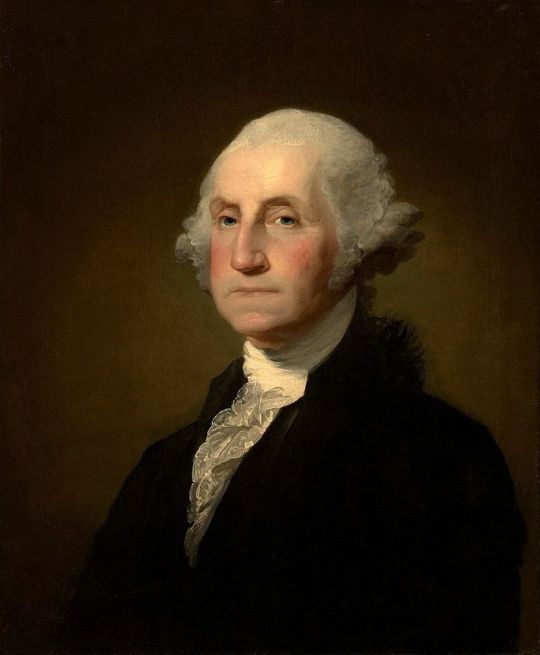
George Washington
"The Arts of the enemy, and the low dirty tricks which they are daily practising is an evincing proof that they are lost to all Sense of virtue and honor, and that they will stick at nothing however incompatible with truth and manliness to carry their points." George Washington, Letter to John Augustine Washington, Valley Forge, May 1778
4 notes
·
View notes
Text
Who is the worst?
Round 1: Benjamin Tallmadge vs Friedrich Wilhelm von Steuben
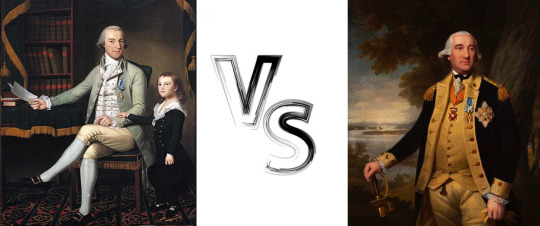
Benjamin Tallmadge (February 25, 1754 – March 7, 1835) was an American military officer, spymaster, and politician. He is best known for his service as an officer in the Continental Army during the American Revolutionary War. He acted as leader of the Culper Ring during the war, a celebrated network of spies in New York where major British forces were based. He also led a successful raid across Long Island that culminated in the Battle of Fort St. George. After the war, Tallmadge was elected to the US House of Representatives as a member of the Federalist Party.
In 1792, Tallmadge was appointed postmaster of Litchfield, Connecticut. He served until he resigned to assume his seat in Congress. He established a successful mercantile and importing business and was the first president of the Phoenix Branch Bank, a position he held from 1814 to 1826.
Over the course of his career, Tallmadge owned and hired a number of slaves, though he became an abolitionist after conversion to Congregationalism.
Friedrich Wilhelm August Heinrich Ferdinand von Steuben (born Friedrich Wilhelm Ludolf Gerhard Augustin Louis von Steuben; September 17, 1730 – November 28, 1794), also referred to as Baron von Steuben was a Prussian military officer who played a leading role in the American Revolutionary War by reforming the Continental Army into a disciplined and professional fighting force. His contributions marked a significant improvement in the performance of U.S. troops, and he is subsequently regarded as one of the fathers of the United States Army.
Upon the Count's recommendation, Steuben was introduced to future president George Washington by means of a letter from Franklin as a "Lieutenant General in the King of Prussia's service", an exaggeration of his actual credentials that appears to be based on a mistranslation of his service record. He was advanced travel funds and left Europe from Marseilles on Friday, September 26, 1777, on board the frigate Flamand.
#sorry this is a tough one#founding father bracket#worst founding father#founding fathers#amrev#brackets#polls#benjamin tallmadge#friedrich wilhelm von steuben#baron von steuben
8 notes
·
View notes
Text
"The misfortune which ensued": The defeat at Germantown [Part 3]
Continued from Part 2
This was originally written in October 2016 when I was a research fellow at the Maryland State Archives. It has been reprinted from Academia.edu and my History Hermann WordPress blog.
© 2016-2023 Burkely Hermann. All rights reserved.
Notes
[1] “To George Washington from Brigadier General Anthony Wayne, 23 April 1778,” Founders Online, National Archives, last modified July 12, 2016; The Annual Register, 135. The Annual Register says that British patrols found the Continentals by 3:00 in the morning, so their attack was no surprise.
[2] Mark Andrew Tacyn, “’To the End:’ The First Maryland Regiment and the American Revolution” (PhD diss., University of Maryland College Park, 1999), 143-144; Pension of James Morris, Revolutionary War Pension and Bounty Land-Warrant Application Files, National Archives, NARA M804, Record Group 15, Roll 1771, pension number W. 2035. Courtesy of Fold3.com; James Morris, Memoirs of James Morris of South Farms in Litchfield (New Haven: Yale University Press, 1933), 18; Pension of Jacob Armstrong, Revolutionary War Pensions, National Archives, NARA M804, Record Group 15, pension number S.22090, roll 0075. Courtesy of Fold3.com; Stanley Weintraub, Iron Tears: America’s Battle for Freedom, Britain’s Quagmire: 1775-1783 (New York: Free Press, 2005), 116-117; Andrew O’Shaughnessy, The Men Who Lost America: British Command During the Revolutionary War and the Preservation of the Empire (London: One World Publications, 2013), 109; “Journal of Captain William Beatty 1776-1781,” Maryland Historical Magazine June 1908. Vol. 3, no.2, 110; John Dwight Kilbourne, A Short History of the Maryland Line in the Continental Army (Baltimore: Society of Cincinnati of Maryland, 1992), 14; “From George Washington to Brigadier General Alexander McDougall, 25 September 1777,” Founders Online, National Archives, last modified July 12, 2016; Pension of James Morris, Revolutionary War Pension and Bounty Land-Warrant Application Files, National Archives, NARA M804, Record Group 15, Roll 1771, pension number W. 2035. Courtesy of Fold3.com; James Morris, Memoirs of James Morris of South Farms in Litchfield (New Haven: Yale University Press, 1933), 18; “From George Washington to John Augustine Washington, 18 October 1777,” Founders Online, National Archives, last modified July 12, 2016. The reference to no food or blanket specifically refers to James Morris of Connecticut. Washington’s headquarters was on Pennibecker’s Mill on the Skippack Road from September 26-29 and October 4 to October 8th, 1777. The Continental Army had camped at Chester throughout late September, but Morris says they camped near the Leni River. However, a river of this name does not exist, so he may have meant a branch off the Schuykill River or maybe the Delaware River, since the Leni-Lenape indigenous group lived on the river.
[3] “From George Washington to John Augustine Washington, 18 October 1777,” Founders Online,National Archives, last modified July 12, 2016; “From George Washington to John Page, 11 October 1777,” Founders Online, National Archives, last modified July 12, 2016; “From George Washington to Major General William Heath, 8 October 1777,” Founders Online, National Archives, last modified July 12, 2016; C.H. Lesser, The Sinews of Independence, Monthly Strength Reports of the Continental Army (Chicago: University of Chicago Press, 1976), 80.
[4] Tacyn, 4, 115, 144; Enoch Anderson, Personal Recollections of Captain Enoch Anderson: Eyewitness Accounts of the American Revolution (New York: New York Times & Arno Press, 1971), 44; “From George Washington to Major General William Heath, 8 October 1777,” Founders Online, National Archives, last modified July 12, 2016.
[5] Tacyn, 145.
[6] Anderson, 45.
[7] Anderson, 45.
[8] Anderson, 45.
[9] Tacyn, 145-146; Anderson, 45; “Journal of Captain William Beatty 1776-1781,” 110-111.
[10] Tacyn, 15, 209-210, 289, 291; Pension of James Morris, Revolutionary War Pension and Bounty Land-Warrant Application Files, National Archives, NARA M804, Record Group 15, Roll 1408, pension number W. 11929. Courtesy of Fold3.com. Thomas Carvin and James Reynolds were said to be missing after the battle. Reportedly, a Marylander named Elisha Jarvis was ordered by William Smallwood to guard the baggage train at the Battle of Germantown.
[11] Thomas Thorleifur Sobol, “William Maxwell, New Jersey’s Hard Fighting General,” Journal of the American Revolution, August 15, 2016. Accessed October 3, 2016; “From George Washington to Jonathan Trumbull, Sr., 7 October 1777,” Founders Online, National Archives, last modified July 12, 2016.
[12] David Ross, The Hessian Jagerkorps in New York and Pennsylvania, 1776-1777, Journal of the American Revolution, May 14, 2015. Accessed October 3, 2016.
[13] “From George Washington to John Hancock, 5 October 1777,” Founders Online,National Archives, last modified July 12, 2016.
[14] Pension of James Morris; Morris, 18-19.
[15] Don N. Hagist, “Who killed General Agnew? Not Hans Boyer,” Journal of the American Revolution, August 17, 2016. Accessed October 3, 2016; Don N. Hagist, “Martin Hurley’s Last Charge,” Journal of the American Revolution, April 14, 2015. Accessed October 3, 2016; John Rees, “War as Waiter: Soldier Servants,” Journal of the American Revolution, April 28, 2015. Accessed October 3, 2016; Thomas Verenna, “20 Terrifying Revolutionary War Soldier Experiences,” Journal of the American Revolution, April 24, 2015. Accessed October 3, 2016; Thomas Verenna, “Explaining Pennsylvania’s Militia,” Journal of the American Revolution, June 17, 2014. Accessed October 3, 2016; “General Orders, 11 November 1777,” Founders Online, National Archives, last modified July 12, 2016. Richard St. George and Martin Hurley of the British army were wounded and James Agnew, a British general, was killed.
[16] Pension of Jacob Armstrong; The Annual Register or a View of the History, Politics, and Literature, for the Year 1777 (4th Edition, London: J. Dosley, 1794), 129-130; Sir George Otto Trevelyan, The American Revolution: Saratoga and Brandywine, Valley Forge, England and France at War, Vol. 4 (London: Longmans Greens Co., 1920), 275; O’Shaughnessy, 110; “Journal of Captain William Beatty 1776-1781,” 110-111; Kilbourne, 17, 19; “From George Washington to Jonathan Trumbull, Sr., 7 October 1777,” Founders Online, National Archives, last modified July 12, 2016.
[17] “From George Washington to Lieutenant Colonel Samuel Smith, 7 October 1777,” Founders Online,National Archives, last modified July 12, 2016.
[18] “From George Washington to Major General William Heath, 8 October 1777,” Founders Online, National Archives, last modified July 12, 2016; “From George Washington to John Page, 11 October 1777,” Founders Online, National Archives, last modified July 12, 2016; “From George Washington to John Augustine Washington, 18 October 1777,” Founders Online,National Archives, last modified July 12, 2016; “From George Washington to John Hancock, 7 October 1777,” Founders Online,National Archives, last modified July 12, 2016.
[19] “From George Washington to John Augustine Washington, 18 October 1777,” Founders Online,National Archives, last modified July 12, 2016.
[20] “Journal of Captain William Beatty 1776-1781,” 111; Anderson, 45-46.
[21] “From George Washington to John Hancock, 5 October 1777,” Founders Online,National Archives, last modified July 12, 2016; “From George Washington to Jonathan Trumbull, Sr., 7 October 1777,” Founders Online, National Archives, last modified July 12, 2016; “From George Washington to John Hancock, 7 October 1777,” Founders Online, National Archives, last modified July 12, 2016; “From George Washington to Major General William Heath, 8 October 1777,” Founders Online, National Archives, last modified July 12, 2016; “From George Washington to John Page, 11 October 1777,” Founders Online, National Archives, last modified July 12, 2016; “From George Washington to John Augustine Washington, 18 October 1777,” Founders Online, National Archives, last modified July 12, 2016. In his letters he said that Grant was wounded while Nash (died after the battle from wounds) and Agnew were killed.
[22] Pension of James Morris; Morris, 19.
[23] “General Orders, 5 October 1777,” Founders Online,National Archives, last modified July 12, 2016; Annual Register, 136.
[24] “From George Washington to John Hancock, 5 October 1777,” Founders Online,National Archives, last modified July 12, 2016; “To George Washington from Major John Clark, Jr., 6 October 1777,” Founders Online, National Archives, last modified July 12, 2016; “From George Washington to Lieutenant Colonel Samuel Smith, 7 October 1777,” Founders Online,National Archives, last modified July 12, 2016; “From George Washington to Jonathan Trumbull, Sr., 7 October 1777,” Founders Online, National Archives, last modified July 12, 2016; “From George Washington to John Hancock, 7 October 1777,” Founders Online,National Archives, last modified July 12, 2016; “From George Washington to Major General Israel Putnam, 8 October 1777,” Founders Online, National Archives, last modified July 12, 2016; “From George Washington to Major General William Heath, 8 October 1777,” Founders Online, National Archives, last modified July 12, 2016.
[25] “From George Washington to John Augustine Washington, 18 October 1777,” Founders Online, National Archives, last modified July 12, 2016; “To George Washington from Major John Clark, Jr., 6 October 1777,” Founders Online, National Archives, last modified July 12, 2016; “From George Washington to Lieutenant Colonel Samuel Smith, 7 October 1777,” Founders Online,National Archives, last modified July 12, 2016; “From George Washington to Jonathan Trumbull, Sr., 7 October 1777,” Founders Online, National Archives, last modified July 12, 2016; “From George Washington to John Hancock, 7 October 1777,” Founders Online,National Archives, last modified July 12, 2016; “From George Washington to Major General Israel Putnam, 8 October 1777,” Founders Online, National Archives, last modified July 12, 2016; “To George Washington from Lieutenant Colonel Samuel Smith, 9 October 1777,” Founders Online, National Archives, last modified July 12, 2016; “From George Washington to John Page, 11 October 1777,” Founders Online, National Archives, last modified July 12, 2016; “To George Washington from Captain Henry Lee, Jr., 15 October 1777,” Founders Online, National Archives, last modified July 12, 2016; “From George Washington to John Augustine Washington, 18 October 1777,” Founders Online,National Archives, last modified July 12, 2016; Annual Register, 137. One letter says fifty British were killed and another says fifty-seven. The British Annual Register confirms that Nash was killed.
[26] Annual Register, 136-137.
[27] Pension of James Morris; Morris, 19.
[28] Pension of James Morris; Morris, 19-25; “To George Washington from Pelatiah Webster, 19 November 1777,” Founders Online, National Archives, last modified July 12, 2016; “To George Washington from Thomas McKean, 8 October 1777,” Founders Online,National Archives, last modified July 12, 2016,
[29] Pension of James Morris, Morris, 23-29, 31; “To George Washington from Captain Henry Lee, Jr., 9 October 1777,” Founders Online, National Archives, last modified July 12, 2016; “To George Washington from Lieutenant Colonel Persifor Frazer, 9 October 1777,” Founders Online, National Archives, last modified July 12, 2016; “To George Washington from Pelatiah Webster, 19 November 1777,” Founders Online, National Archives, last modified July 12, 2016. He also said that he was then shipped to Philadelphia where he served a prisoner on Long Island as a farm laborer until May 1781.
[30] “To John Adams from Joseph Ward, 9 October 1777,” Founders Online,National Archives, last modified July 12, 2016.
[31] “The Committee for Foreign Affairs to the American Commissioners, 6[–9] October 1777,” Founders Online, National Archives, last modified July 12, 2016; “To Benjamin Franklin from the Massachusetts Board of War, 24 October 1777: résumé,” Founders Online, National Archives, last modified July 12, 2016.
[32] “To George Washington from Major General John Sullivan, 25 November 1777,” Founders Online,National Archives, last modified July 12, 2016; “Major General John Sullivan’s Opinion, 29 October 1777,” Founders Online, National Archives, last modified July 12, 2016.
[33] “To John Adams from Benjamin Rush, 13 October 1777,” Founders Online,National Archives, last modified July 12, 2016; “General Orders, 19 October 1777,” Founders Online,National Archives, last modified July 12, 2016; “To George Washington from Major General Nathanael Greene, 24 November 1777,” Founders Online,National Archives, last modified July 12, 2016; “General Orders, 22 December 1777,” Founders Online, National Archives, last modified July 12, 2016; “To George Washington from Captain Edward Vail, 22 November 1777,” Founders Online, National Archives, last modified July 12, 2016; “General Orders, 13 June 1778,” Founders Online,National Archives, last modified July 12, 2016; “To George Washington from William Gordon, 25 February 1778,” Founders Online,National Archives, last modified July 12, 2016; “To George Washington from Major General Adam Stephen, 9 October 1777,” Founders Online, National Archives, last modified July 12, 2016.
[34] Trevelyan, 249; O’Shaughnessy, 111; Christopher Hibbert, George III: A Personal History (New York: Basic Books, 1998), 154-155; “From John Adams to James Lovell, 26 July 1778,” Founders Online,National Archives, last modified July 12, 2016.
[35] Annual Register, 137-141.
[36] Anderson, 53; Tacyn, 146; Thomas Thorleifur Sobol, “William Maxwell, New Jersey’s Hard Fighting General,” Journal of the American Revolution, August 15, 2016. Accessed October 3, 2016; “Journal of Captain William Beatty 1776-1781,” 110; Kilbourne, 14; “From George Washington to George Clinton, 15 October 1777,” Founders Online, National Archives, last modified July 12, 2016; “From George Washington to Major General Israel Putnam, 15 October 1777,” Founders Online, National Archives, last modified July 12, 2016; “To George Washington from Major John Clark, Jr., 27 October 1777,” Founders Online, National Archives, last modified July 12, 2016; “To George Washington from Brigadier General Henry Knox, 26 November 1777,” Founders Online, National Archives, last modified July 12, 2016; “To George Washington from Major John Clark, Jr., 6 October 1777,” Founders Online, National Archives, last modified July 12, 2016; “From George Washington to John Hancock, 7 October 1777,” Founders Online,National Archives, last modified July 12, 2016.
[37] Journal and Correspondence of the Council of Maryland, April 1, 1778 through October 26, 1779 Archives of Maryland Online Vol. 21, 118; Kilbourne, 21-22, 24-27, 29-30, 31, 33; Tacyn, 241. Some argue that in the battle of Eutaw Springs parts of the battle of Germantown were repeated.
#battle of germantown#revolutionary war#american revolution#british victory#military history#us history#notes
5 notes
·
View notes
Photo
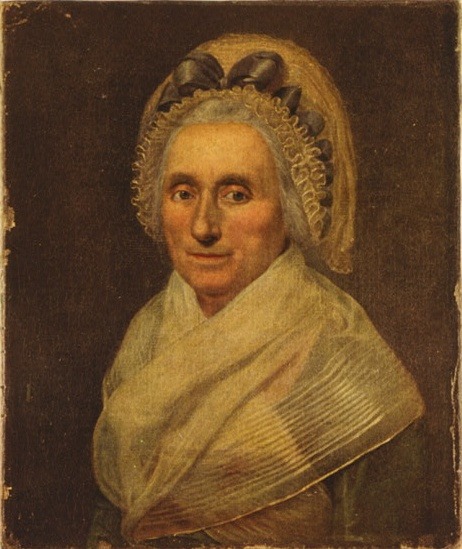
This Week in History: George Washington’s Mother
At about this time in 1789, George Washington’s mother passes away from breast cancer. Did you ever wonder about his mother? Did the two get along? What was their relationship like?
Not much is known about Mary Ball Washington’s early years, but we know that she was an orphan by the time she was 12 years old. She later married a widower, Augustine Washington.
No one could then know it, but the marriage would produce the father of a new American nation!
Mary and Augustine’s first son together was born in February 1732.
The story continues here: https://www.taraross.com/post/tdih-mary-washington
#this week in history#history#history blog#George Washington#founding fathers#America#freedom#liberty#sharethehistory
4 notes
·
View notes
Text
24 Days of La Fayette 2022 - La Fayette's aide-de-camps
Day 1 - Edmund Brice • Day 2 - Louis Cloquet de Vrigny • Day 3 - Pierre, Chevalier Du Rousseau de Fayolle • Day 4 - Louis-Pierre, Marquis de Vienne • Day 5 - John E. Hagey • Day 6 - Carter Page • Day 7 - Cadwallader Jones • Day 8 - William Constable • Day 9 - Comte de Charlus • Day 10 - George Augustine Washington • Day 11 - Jean-Louis and Alexandre Romeuf • Day 12 - André Toussaint Delarûe • Day 13 - Gabriel de Queyssat • Day 14 - Joseph-Léonard Poirey • Day 15 - William Langborn • Day 16 - François-Louis Teissèdre de Fleury, Marquis de Fleury • Day 17 - Joseph-Pierre-Charles, Baron de Frey • Day 18 - Charles-Albert, comte de Moré de Pontgibaud • Day 19 - Jean-Joseph Soubadère de Gimat • Day 20 - Louis-Saint-Ange, chevalier Morel de La Colombe • Day 21 - Michel Capitaine du Chesnoy • Day 22 - Jean-Baptiste, Chevalier de Gouvion • Day 23 - Presley Neville • Day 24 - James McHenry
#24 days of la fayette#la fayette's aide de camps#marquis de lafayette#la fayette#french history#american history#american revolution#history#resources#master post
15 notes
·
View notes
Text
Events 12.25 (before 1900)
36 – Forces of Emperor Guangwu of the Eastern Han, under the command of Wu Han, conquer the separatist Chengjia empire, reuniting China.
274 – A temple to Sol Invictus is dedicated in Rome by Emperor Aurelian.
333 – Roman Emperor Constantine the Great elevates his youngest son Constans to the rank of Caesar.
336 – First documentary sign of Christmas celebration in Rome.
350 – Vetranio meets Constantius II at Naissus (Serbia) and is forced to abdicate his imperial title. Constantius allows him to live as a private citizen on a state pension.
508 – Clovis I, king of the Franks, is baptized into the Catholic faith at Reims, by Saint Remigius.
597 – Augustine of Canterbury and his fellow-labourers baptise in Kent more than 10,000 Anglo-Saxons.
800 – The coronation of Charlemagne as Holy Roman Emperor, in Rome.
820 – Eastern Emperor Leo V is murdered in a church of the Great Palace of Constantinople by followers of Michael II.
1000 – The foundation of the Kingdom of Hungary: Hungary is established as a Christian kingdom by Stephen I of Hungary.
1013 – Sweyn Forkbeard takes control of the Danelaw and is proclaimed king of England.
1025 – Coronation of Mieszko II Lambert as king of Poland.
1046 – Henry III is crowned Holy Roman Emperor by Pope Clement II.
1066 – William the Conqueror, Duke of Normandy is crowned king of England, at Westminster Abbey, London.
1076 – Coronation of Bolesław II the Generous as king of Poland.
1100 – Baldwin of Boulogne is crowned the first King of Jerusalem in the Church of the Nativity in Bethlehem.
1130 – Count Roger II of Sicily is crowned the first king of Sicily.
1261 – Eleven-year-old John IV Laskaris of the restored Eastern Roman Empire is deposed and blinded by orders of his co-ruler Michael VIII Palaiologos.
1492 – The carrack Santa María, commanded by Christopher Columbus, runs onto a reef off Haiti due to an improper watch.
1553 – Battle of Tucapel: Mapuche rebels under Lautaro defeat the Spanish conquistadors and executes the governor of Chile, Pedro de Valdivia.
1559 – Pope Pius IV is elected, four months after his predecessor's death.
1758 – Halley's Comet is sighted by Johann Georg Palitzsch, confirming Edmund Halley's prediction of its passage. This was the first passage of a comet predicted ahead of time.
1766 – Mapuches in Chile launch a series of surprise attacks against the Spanish starting the Mapuche uprising of 1766.
1776 – George Washington and the Continental Army cross the Delaware River at night to attack Hessian forces serving Great Britain at Trenton, New Jersey, the next day.
1793 – General "Mad Anthony" Wayne and a 300 man detachment identify the site of St. Clair's 1791 defeat by the large number of unburied human remains at modern Fort Recovery, Ohio.
1809 – Dr. Ephraim McDowell performs the first ovariotomy, removing a 22-pound tumor.
1814 – Rev. Samuel Marsden holds the first Christian service on land in New Zealand at Rangihoua Bay.
1815 – The Handel and Haydn Society, oldest continually performing arts organization in the United States, gives its first performance.
1826 – The Eggnog Riot at the United States Military Academy concludes after beginning the previous evening.
1831 – The Great Jamaican Slave Revolt begins; up to 20% of Jamaica's slaves mobilize in an ultimately unsuccessful fight for freedom.
1837 – Second Seminole War: American general Zachary Taylor leads 1,100 troops against the Seminoles at the Battle of Lake Okeechobee.
1868 – Pardons for ex-Confederates: United States President Andrew Johnson grants an unconditional pardon to all Confederate veterans.
1 note
·
View note
Text
Belle Époque
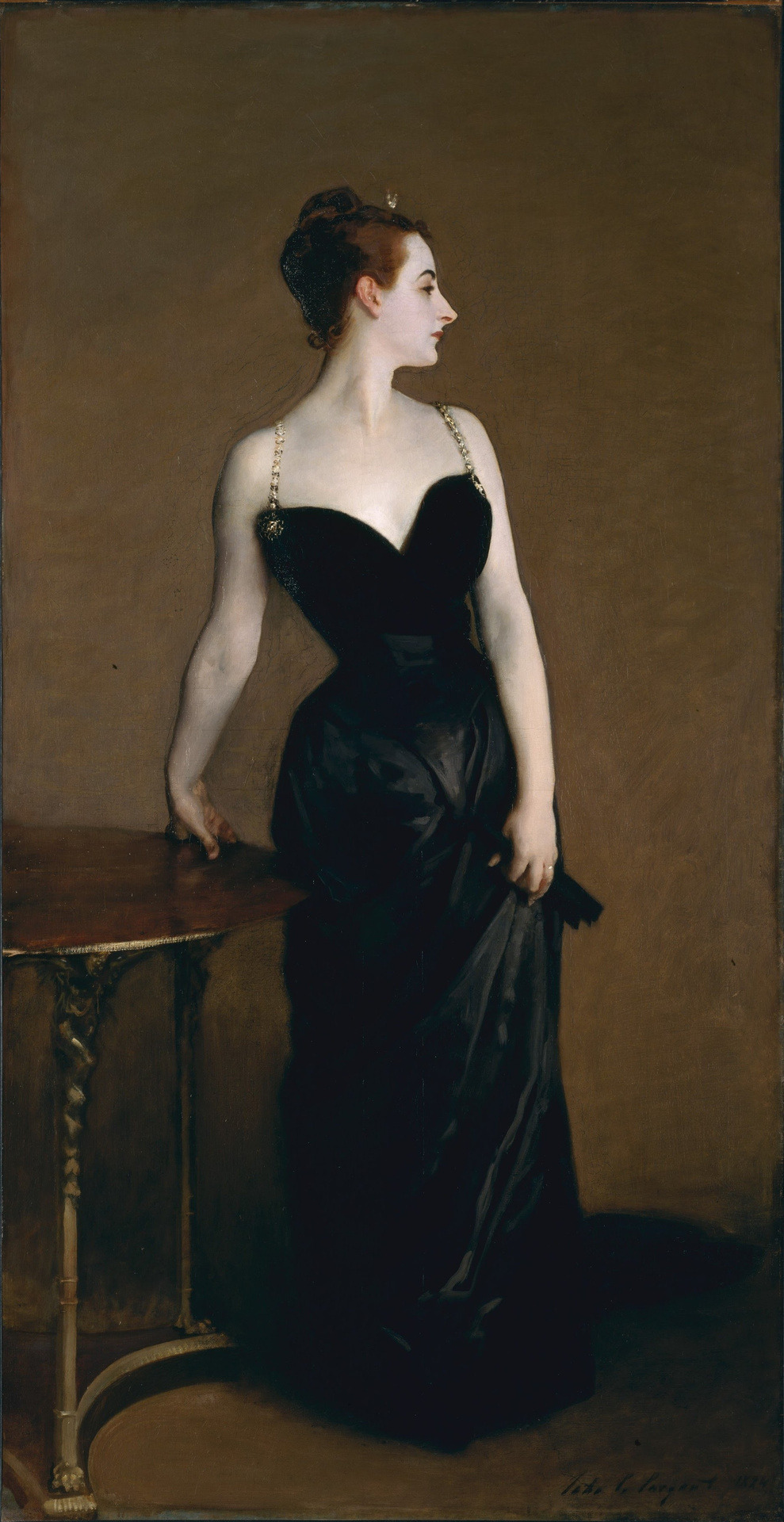
Madame X (Madame Pierre Gautreau), 1883-84 (The Metropolitan Museum of Art, New York) | John Singer Sargent (1865-1925, USA)

La divina in blu, 1890 ca. | Giovanni Boldini (1842-1931, Italia)
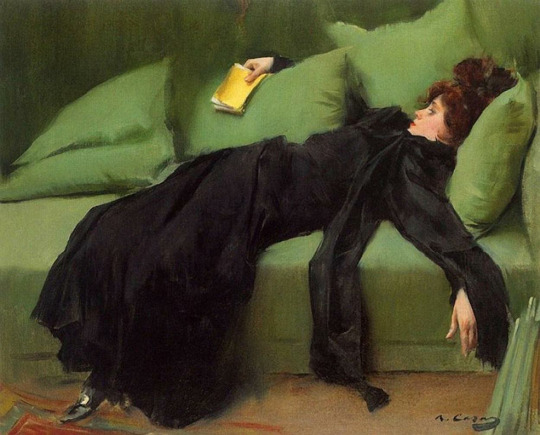
After the dance, 1899 (Museo de Montserrat) | Ramon Casas (1866-1932, España)

Ritratto di Emiliana Concha de Ossa, 1901 (Brera, Milano) | Giovanni Boldini (1842-1931, Italia)
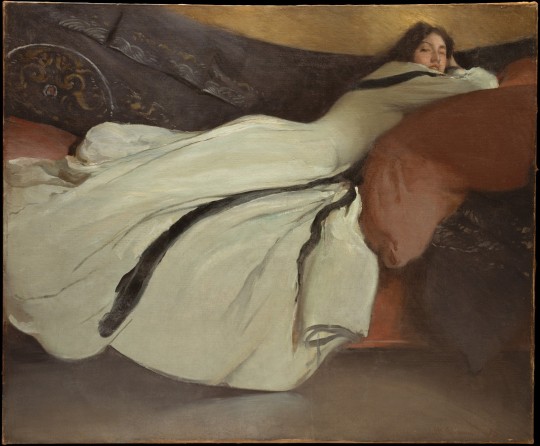
Repose, 1895 | John White Alexander (1856-1915, USA)
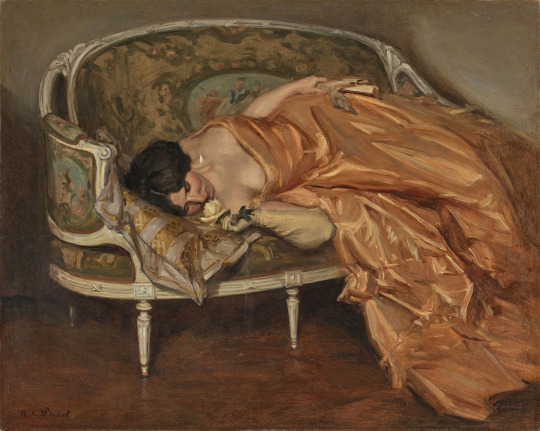
Elegant lady on a sofa | René-Xavier Prinet (1861-1946, France)

In lettura (woman reading) | Giovanni Boldini (1842-1931, Italia)
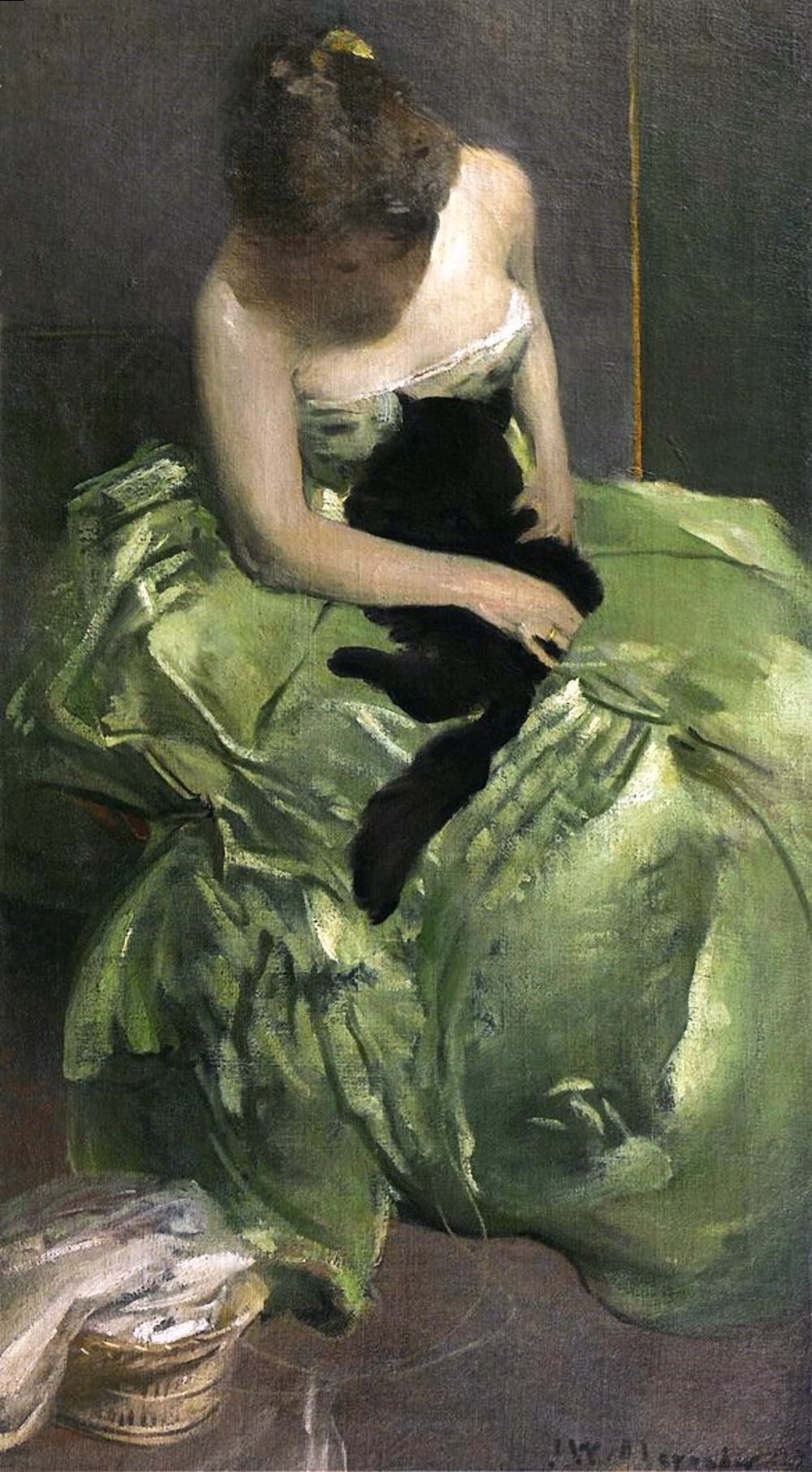
The green dress, 1890 | John White Alexander (1856-1915, USA)

Rachel Feinstein (1971, USA) | ph., David Seidner (1957-1999, USA)
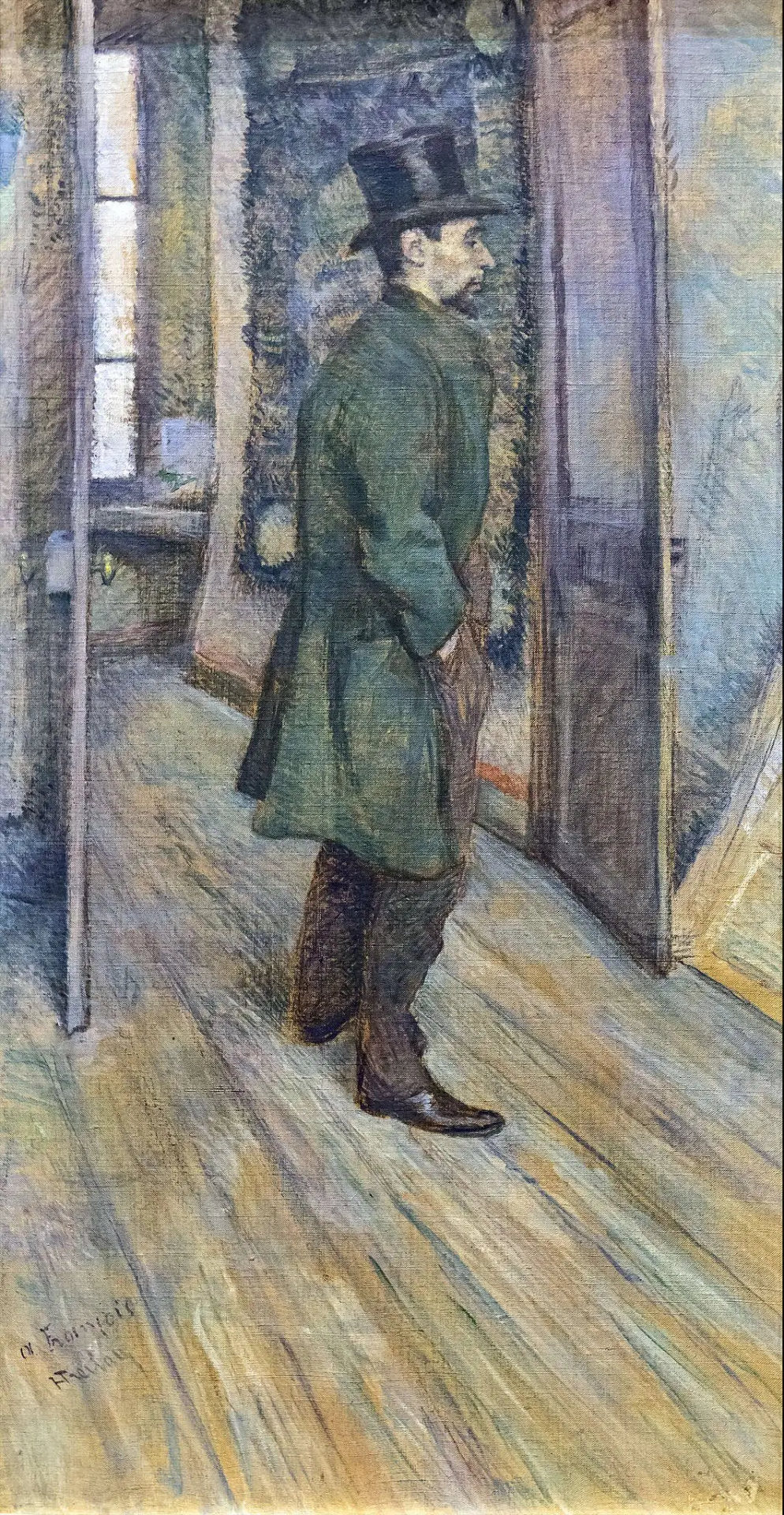
Ritratto di François Gauzi, 1888 (Musée des Augustins, Tolosa) | Henri de Toulouse-Lautrec (1864-1901, France)
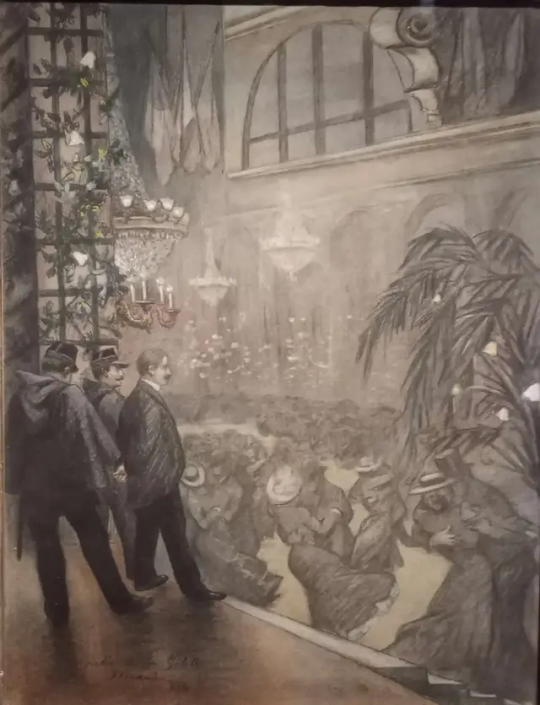
Le Moulin de la Galette, 1894 ca. | Charles Maurin (1856-1914, France)

L’Entrée au bal, 1858 (Musée Félicien Rops, Namur, Belgium) | Félicien Rops (1833-1898, Belgium)
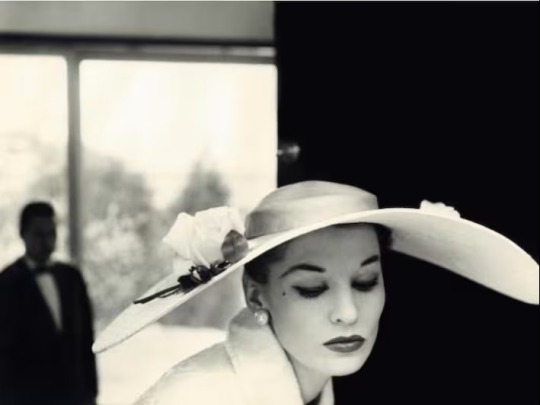
Fashion, Mellbourne, 1955 | ph., Helmut Newton (1920-2004, Germany-Australia)
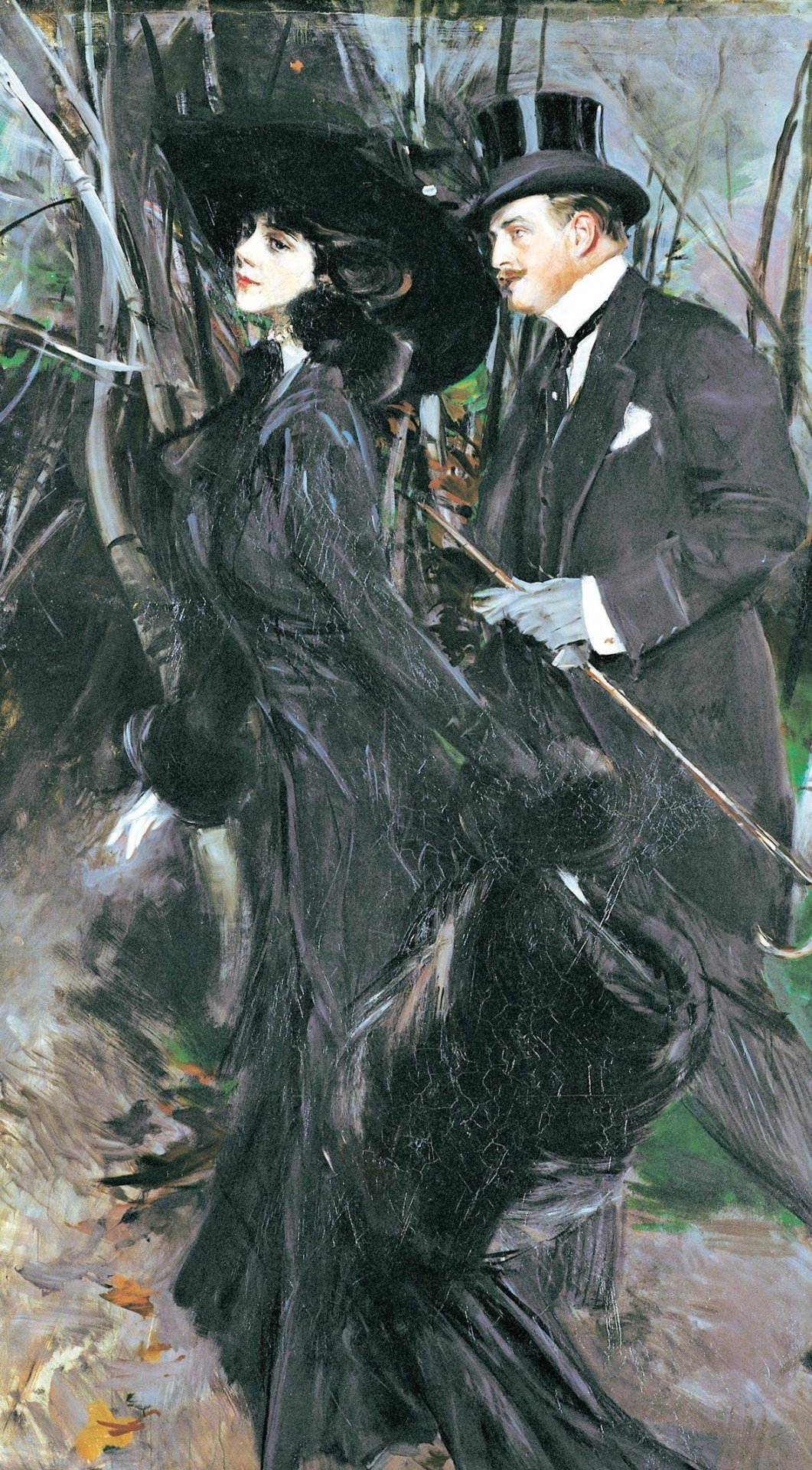
La passeggiata al Bois de Boulogne, 1909 (Museo Giovanni Boldini, Ferrara) | Giovanni Boldini (1842-1931, Italia)

Coquette (Civetta) | Pierre Franc Lamy (1855-1919, France)

Le chapeau noir | Jean-Louis Forain (1852-1931, France)

Dame en blanc | Paul César Helleu (1859-1927, France)

Portrait Mademoiselle Alice Guérin | Paul César Helleu (1859-1927, France)

Conversazione nel giardino di Luxembourg (Conversation in the Luxembourg Garden), 1892 | Vittorio Matteo Corcos (1859-1933, Italia)

Le petit déjeuner des rameurs, 1880-81 (Philips Collection, Washington) | Pierre-Auguste Renoir (1841-1919, France)

Sogni (Elena Vecchi), 1896 (Galleria Nazionale di Arte Moderna, Roma) | Vittorio Matteo Corcos (1859-1933, Italia)

Ritratto di Madame Georges Van Muyden, 1917 (Museo d'arte di San Paolo) | Amedeo Modigliani (1884-1920, Italia)
1 note
·
View note
Text
2023 NHL Draft Results Picks 1-50
1st overall, Chicago: Connor Bedard (Regina Pats/North Vancouver, British Columbia)
2nd overall, Anaheim: Leo Carlsson (Örebro H.K./Karlstad, Sweden)
3rd overall, Columbus: Adam Fantilli (University Of Michigan Wolverines/King Township, Ontario)
4th overall, San José: Will Smith (USNTDP/Lexington, Massachusetts)
5th overall, Montreal: David Reinbacher (E.H.C. Kloten/Hohenems, Austria)
6th overall, Arizona: Dmitriy Simashev (K.K. Lokomotiv/Kostroma, Russia)
7th overall, Philadelphia: Matvei Michkov (K.K. S.K.A./Perm, Russia)
8th overall, Washington: Ryan Leonard (USNTDP/Amherst, Massachusetts)
9th overall, Detroit: Nate Danielson (Brandon Wheat Kings/Red Deer, Alberta)
10th overall, St. Louis: Dalibor Dvorský (Allmänna Idrottsklubben Ishockeyförening/Zvolen, Slovakia)
11th overall, Vancouver: Tom Willander (Rögle Bandyklubb J20/Stockholm, Sweden)
12th overall, Arizona: Daniil But (K.K. Lokomotiv/Yaroslavl, Russia)
13th overall, Buffalo: Zach Benson (Winnipeg Ice/Langley, British Columbia)
14th overall, Pittsburgh: Brayden Yager (Moose Jaw Warriors/Saskatoon, Saskatchewan)
15th overall, Nashville: Matthew Wood (University Of Connecticut Huskies/Lethbridge, Alberta)
16th overall, Calgary: Samuel Honzek (Vancouver Giants/Trenčín, Slovakia)
17th overall, Detroit: Axel Sandin-Pellikka (Skellefteå A.I.K./Gällivare Stad, Sweden)
18th overall, Winnipeg: Colby Barlow (Owen Sound Attack/Orillia, Ontario)
19th overall, Chicago: Oliver Moore (USNTDP/Mounds View, Minnesota)
20th overall, Seattle: Eduard Šalé (H.K. Kometa Brno/Brno, Czech Republic)
21st overall, Minnesota: Charlie Stramel (University Of Wisconsin, Madison Badgers/Rosemount, Minnesota)
22nd overall, Philadelphia: Oliver Bonk (London Knights/Ottawa, Ontario)
23rd overall, New York Rangers: Gabe Perreault (USNTDP/Sherbrooke, Quebec)
24th overall, Nashville: Tanner Molendyk (Saskatoon Blades/Kamloops, British Columbia)
25th overall, St. Louis: Otto Stenberg Frölunda Hockeyklubb/Stenungsud Stad, Sweden)
26th overall, San José: Quentin Musty (Sudbury Wolves/Hamburg, New York)
27th overall, Colorado: Calum Ritchie (Oshawa Generals/Brampton, Ontario)
28th overall, Toronto: Easton Cowan (London Knights/Strathroy-Caradoc, Ontario)
29th overall, St. Louis: Theo Lindstein (Brynäs I.F./Gävle, Sweden)
30th overall, Carolina: Bradly Nadeau (Penticton Vees/Saint-François-De-Madawaska, New Brunswick)
31st overall, Colorado: Mikhail Gulyayev (K.K. Avangard/Novosibirsk, Russia)
32nd overall, Vegas: David Edstrom (Frölunda Hockeyklubb/Göteborg, Sweden)
33rd overall, Anaheim: Nico Myatovic (Seattle Thunderbirds/Prince George, British Columbia)
34th overall, Columbus: Gavin Brindley (University Of Michigan Wolverines/Lee County, Florida)
35th overall, Chicago: Adam Gajan (Chippewa Steel/Poprad, Slovakia)
36th overall, San José: Kasper Halttunen (H.I.F.K./Helsinki, Finland)
37th overall, Tampa Bay: Ethan Gauthier (Sherbrooke Phoenix/Drummondville, Quebec)
38th overall, Arizona: Michael Hrabal (University Of Massachusetts, Amherst Minutemen/Prague, Czech Republic)
39th overall, Buffalo: Anton Wahlberg (Malmö Rödhökar/Malmö, Sweden)
40th overall, Washington: Andrew Cristall (Kelowna Rockets/Vancouver, British Columbia)
41st overall, Detroit: Trey Augustine (Michigan State University Spartans/South Lyon, Michigan)
42nd overall, Detroit: Andrew Gibson (Sault Ste. Marie Greyhounds/LaSalle, Ontario)
43rd overall, Nashville: Felix Nilsson (Rögle Bandyklubb J20/Stockholm, Sweden)
44th overall, Chicago: Roman Kantserov (Stalnye Lisy/Magnitogorsk, Russia)
45th overall, Buffalo: Maxim Štrbák(Michigan State University Spartans/Košice, Slovakia)
46th overall, Nashville: Kalan Lind (Red Deer Rebels/Swift Current, Saskatchewan)
47th overall, Detroit: Brady Cleveland (USNTDP/Wausau, Wisconsin)
48th overall, Calgary: Étienne Morin (Moncton Wildcats/Salaberry-De-Valleyfield, Quebec)
49th overall, New York Islanders:: Danny Nelson (USNTDP/Maple Grove, Minnesota)
50th overall, Seattle: Carson Rehkopf (Kitchener Rangers/Barrie, Ontario)
#Sports#Hockey#NHL#Canada#Saskatchewan#Celebrities#British Columbia#Sweden#Columbus Blue Jackets#Michigan#Ontario#National Teams#U.S.A.#U.S.#Massachusetts#Montreal Canadiens#Switzerland#Austria#Arizona Coyotes#Russia#Philadelphia Flyers#Washington Capitals#Detroit Red Wings#Manitoba#Alberta#St. Louis Blues#Slovakia#Buffalo Sabres#Connecticut#Calgary Flames
1 note
·
View note
Text
The Goods of Educational Travel
St. Augustine of Hippo wrote, "The world is a book and those who do not travel read only one page." This quote provides an insightful perspective on travel. Travel, like a book, is a source of knowledge. Those who travel broadly are similar to those who read much. These experiences can increase our knowledge and kindle the affections that drive us to learn more.
Educational travel is also a way for us to provide a deeper knowledge of the realities that we learn about in books. On this Grand Tour, students will visit sites where significant events took place in American history. In visiting these places, we experience a new dimension to these facts and events that helps their "realness" become more vivid and striking. Paul Revere's famous ride seems less like a children's story and more like real history when you walk through Boston's freedom trail. The history behind the writing of the U.S. Constitution looks differently after you have toured Independence hall and looked at the chair where George Washington sat. Words on a page can convey truth propositionally, but visiting a historic site communicates truth that outstrips language. In addition to the facts that can be stated, one also acquires the sights, scents, tastes, sounds, and touches of reality.
Another reason to travel is the exposure to other cultures. Rene Descartes observed, "Travelling is almost like talking with those of other centuries." Going to new places can almost be like experiencing other times. There can be different languages, foods, clothing, music. The experience of being submerged into what is different challenges us to question the values and practices of our own culture. Descartes goes on to write, "It is useful to know something of the manners of different nations, that we may be enabled to form a more correct judgment regarding our own, and be prevented from thinking that everything contrary to our customs is ridiculous and irrational, a conclusion usually come to by those whose experience has been limited to their own country." Travel, in other words, helps us gain perspective to judge our own cultural practices and to recognize truths that transcend culture. It even helps us appreciate the unique things about Lubbock, Texas.
From this perspective, the portrait of heaven where people from all nations worship the Lord (Rev. 5:9) also begins to look more real. The faces, accents, and other cultural hues take on more specificity. These people from other nations mentioned in Revelation appear more like the people I've encountered on my journeys. The truth that God loves the whole world is understood in a new light after one travels broadly.
Of course, there are many good reasons to travel. I can't list them all. But perhaps one thing that makes the top of my list is that travel creates common experiences that often unite deep friendships. These shared experiences often serve as fond memories of cherished time and special moments with our students. I always return from these trips feeling like I know these students (most of whom I have known for years already), and very grateful for each one of them. Having travelled together and shared these unique experiences together, we return a closer fellowship. I'm looking forward to sharing this precious time with the class of 2023.
-- John DePoe

1 note
·
View note
Text

Chato, circa 1884
Bidayajislnl, more commonly known as Chato, was a Chiricahua Apache subchief who carried out several raids on settlers in Arizona in the 1870s. He was a protege of Cochise, and he surrendered with Cochise in 1872 going to live on the San Carlos Reservation in southern Arizona, where he became an Apache Scout. Following his service as a scout he was taken prisoner after being coerced to travel to Washington, D.C. Chato was imprisoned in St. Augustine, Florida along with almost 500 other Apache at Fort Marion. Chato was born in 1854 in Arizona into the Chiricahua Apache band and a cousin to Mangas Coloradas.He wanted to ascend to Chief of the Warm Springs Apache following the death of Victorio, but was succeeded by Nana. Since 1876, the Chiricahua Apaches theoretically lived at the San Carlos Reservation in southeastern Arizona, where supplies were inadequate, diseases rife, and politics corrupt. Many escaped to the Sierra Madre Mountains of northern Mexico, where they supported themselves by raiding and plundering on both sides of the border. After the arrest of Noch-del-klinne and the rebellion of the Apache scouts, Chato slipped away from the reservation with other Apache such as Juh, Naiche, and Geronimo, who feared for their lives. General George Crook and 250 men attacked Chato's ranchera in June 1883, so Chato surrendered with Geronimo and others to General Crook. Chato then served under General Crook as a scout, including the subsequent expedition into the Sierra Madre after Geronimo in 1886. Upon his return to Arizona, Chato led a peace delegation to Washington where he was presented with a silver medal by President Grover Cleveland. On his way back, at Fort Leavenworth he was arrested and deported to Fort Marion in Florida, then to Fort Pickens in Florida, then moved to Mount Vernon, Alabama.
#chato#Bidayajislnl#chiricahua#apache#warmspringsapache#battleofapachepass#apachewars#mexico#newmexico#trueamerican#nativeamericans#19thcentury#victorio#lozen#cochise#blacknife#mangascoloras#naiche#nana#geronimo#loco#sanjuan#1880s
0 notes